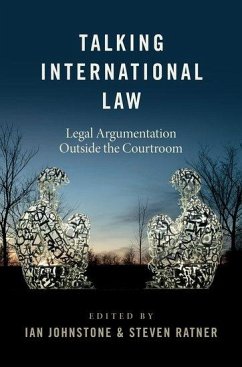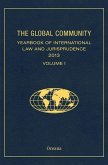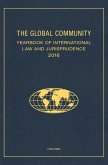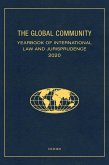Talking International Law
Legal Argumentation Outside the Courtroom
Herausgeber: Johnstone, Ian; Ratner, Steven
Talking International Law
Legal Argumentation Outside the Courtroom
Herausgeber: Johnstone, Ian; Ratner, Steven
- Gebundenes Buch
- Merkliste
- Auf die Merkliste
- Bewerten Bewerten
- Teilen
- Produkt teilen
- Produkterinnerung
- Produkterinnerung
Written by a team of distinguished scholars and senior practitioners from around the world, Talking International Law examines legal argumentation by states and other actors in the settings where it mostly transpires - outside of courts. Offering unprecedented insight into the theory of legal argumentation, the book offers a unique exposure to this multi-faceted practice, deepening our understanding of how international law actually operates in international affairs.
Andere Kunden interessierten sich auch für
![The Global Community Yearbook of International Law and Jurisprudence 2013 The Global Community Yearbook of International Law and Jurisprudence 2013]() The Global Community Yearbook of International Law and Jurisprudence 2013592,99 €
The Global Community Yearbook of International Law and Jurisprudence 2013592,99 €![Global Community Yearbook of International Law and Jurisprudence 2016 (UK) Global Community Yearbook of International Law and Jurisprudence 2016 (UK)]() Global Community Yearbook of International Law and Jurisprudence 2016 (UK)540,99 €
Global Community Yearbook of International Law and Jurisprudence 2016 (UK)540,99 €![The Global Community Yearbook of International Law and Jurisprudence 2020 The Global Community Yearbook of International Law and Jurisprudence 2020]() The Global Community Yearbook of International Law and Jurisprudence 2020410,99 €
The Global Community Yearbook of International Law and Jurisprudence 2020410,99 €![Talking With the Pencil Talking With the Pencil]() William SwintonTalking With the Pencil32,99 €
William SwintonTalking With the Pencil32,99 €![Treatise on International Criminal Law Treatise on International Criminal Law]() Kai AmbosTreatise on International Criminal Law220,99 €
Kai AmbosTreatise on International Criminal Law220,99 €![European Private International Family Law European Private International Family Law]() Michael WilderspinEuropean Private International Family Law258,99 €
Michael WilderspinEuropean Private International Family Law258,99 €![A History of International Law in Italy A History of International Law in Italy]() A History of International Law in Italy178,99 €
A History of International Law in Italy178,99 €-
-
-
Written by a team of distinguished scholars and senior practitioners from around the world, Talking International Law examines legal argumentation by states and other actors in the settings where it mostly transpires - outside of courts. Offering unprecedented insight into the theory of legal argumentation, the book offers a unique exposure to this multi-faceted practice, deepening our understanding of how international law actually operates in international affairs.
Hinweis: Dieser Artikel kann nur an eine deutsche Lieferadresse ausgeliefert werden.
Hinweis: Dieser Artikel kann nur an eine deutsche Lieferadresse ausgeliefert werden.
Produktdetails
- Produktdetails
- Verlag: Hurst & Co.
- Seitenzahl: 376
- Erscheinungstermin: 23. September 2021
- Englisch
- Abmessung: 239mm x 165mm x 30mm
- Gewicht: 680g
- ISBN-13: 9780197588437
- ISBN-10: 0197588433
- Artikelnr.: 61931858
- Herstellerkennzeichnung
- Libri GmbH
- Europaallee 1
- 36244 Bad Hersfeld
- gpsr@libri.de
- Verlag: Hurst & Co.
- Seitenzahl: 376
- Erscheinungstermin: 23. September 2021
- Englisch
- Abmessung: 239mm x 165mm x 30mm
- Gewicht: 680g
- ISBN-13: 9780197588437
- ISBN-10: 0197588433
- Artikelnr.: 61931858
- Herstellerkennzeichnung
- Libri GmbH
- Europaallee 1
- 36244 Bad Hersfeld
- gpsr@libri.de
Ian Johnstone is Professor of International Law at The Fletcher School of Law and Diplomacy at Tufts University. He has served as Dean ad interim and as Academic Dean of the School. Prior to joining Fletcher in 2000, Johnstone served in the United Nations' Office of the Secretary-General. He has held Visiting Professor positions at the University of Toronto Faculty of Law and Munk School of Global Affairs and Public Policy, and at New York University School of Law. He has served on the editorial boards of Global Governance and International Organizations Law Review. Steven R. Ratner is the Bruno Simma Collegiate Professor of Law at the University of Michigan Law School and the Director of the University of Michigan Donia Human Rights Center. His research addresses a range of issues in international law, including linkages with political philosophy and international relations theory. He has served in U.S. State Department's Office of the Legal Adviser, on expert panels of the UN Secretary-General addressing atrocities in Sri Lanka and Cambodia, in the legal division of the International Committee of the Red Cross, and on the State Department's Advisory Committee on International Law.
* Chapter 1. Introduction by Ian Johnstone and Steven Ratner
* Chapter 2. Why Use the Language of the Law in Global Politics? On the
Legitimacy Effects of Claiming to Act Legally by Ingo Venzke
* Chapter 3. Arguing about the Jus ad Bellum by Monica Hakimi
* Chapter 4. International Law as Process: Argumentation in the United
Nations Security Council by Scott P. Sheeran
* Chapter 5. Protesting the Preamble: Normative Pronouncements and
Feminist Jurisprudence in the Security Council by Gina Heathcote
* Chapter 6. Persuasion About/Without International Law: The Case of
Cybersecurity Norms by Steven R. Ratner
* Chapter 7. Nuclear Non-Proliferation Law: Why Argue and to What
Effect? by Ian Johnstone
* Chapter 8. Mass Atrocity Crimes and Human Rights Discourse at the
United Nations Security Council: Three Case Studies by Bruno
Stagno-Ugarte
* Chapter 9. Non-State Armed Actors and International Legal
Argumentation: Patterns, Processes, and Putative Effects by Hyeran Jo
* Chapter 10. Argumentation Through Law: An Analysis of Decisions of
the African Union by Wouter Werner
* Chapter 11. The Sanctions Regime of the African Union in the Case of
Unconstitutional Change of Government by Namira Negm
* Chapter 12. Legal Argumentation in the Evolving Climate Regime by
Jutta Brunnée
* Chapter 13. Law and Science in Environmental Governance: The Effects
of Legal and Scientific Argumentation in the International Whaling
Commission by Lisbeth Zimmermann
* Chapter 14. International Legal Argumentation Outside the Courtroom:
A Focus on Intellectual Property by Edward Kwakwa
* Chapter 15. Arguing about Trade Law Beyond the Courtroom by Kathleen
Claussen
* Chapter 16. The Privileges and Immunities of the United Nations by
Stephen Mathias and Nicolas Perez
* Chapter 17. Towards a Theory of Legal Argumentation by Ian Johnstone
and Steven Ratner
* Chapter 2. Why Use the Language of the Law in Global Politics? On the
Legitimacy Effects of Claiming to Act Legally by Ingo Venzke
* Chapter 3. Arguing about the Jus ad Bellum by Monica Hakimi
* Chapter 4. International Law as Process: Argumentation in the United
Nations Security Council by Scott P. Sheeran
* Chapter 5. Protesting the Preamble: Normative Pronouncements and
Feminist Jurisprudence in the Security Council by Gina Heathcote
* Chapter 6. Persuasion About/Without International Law: The Case of
Cybersecurity Norms by Steven R. Ratner
* Chapter 7. Nuclear Non-Proliferation Law: Why Argue and to What
Effect? by Ian Johnstone
* Chapter 8. Mass Atrocity Crimes and Human Rights Discourse at the
United Nations Security Council: Three Case Studies by Bruno
Stagno-Ugarte
* Chapter 9. Non-State Armed Actors and International Legal
Argumentation: Patterns, Processes, and Putative Effects by Hyeran Jo
* Chapter 10. Argumentation Through Law: An Analysis of Decisions of
the African Union by Wouter Werner
* Chapter 11. The Sanctions Regime of the African Union in the Case of
Unconstitutional Change of Government by Namira Negm
* Chapter 12. Legal Argumentation in the Evolving Climate Regime by
Jutta Brunnée
* Chapter 13. Law and Science in Environmental Governance: The Effects
of Legal and Scientific Argumentation in the International Whaling
Commission by Lisbeth Zimmermann
* Chapter 14. International Legal Argumentation Outside the Courtroom:
A Focus on Intellectual Property by Edward Kwakwa
* Chapter 15. Arguing about Trade Law Beyond the Courtroom by Kathleen
Claussen
* Chapter 16. The Privileges and Immunities of the United Nations by
Stephen Mathias and Nicolas Perez
* Chapter 17. Towards a Theory of Legal Argumentation by Ian Johnstone
and Steven Ratner
* Chapter 1. Introduction by Ian Johnstone and Steven Ratner
* Chapter 2. Why Use the Language of the Law in Global Politics? On the
Legitimacy Effects of Claiming to Act Legally by Ingo Venzke
* Chapter 3. Arguing about the Jus ad Bellum by Monica Hakimi
* Chapter 4. International Law as Process: Argumentation in the United
Nations Security Council by Scott P. Sheeran
* Chapter 5. Protesting the Preamble: Normative Pronouncements and
Feminist Jurisprudence in the Security Council by Gina Heathcote
* Chapter 6. Persuasion About/Without International Law: The Case of
Cybersecurity Norms by Steven R. Ratner
* Chapter 7. Nuclear Non-Proliferation Law: Why Argue and to What
Effect? by Ian Johnstone
* Chapter 8. Mass Atrocity Crimes and Human Rights Discourse at the
United Nations Security Council: Three Case Studies by Bruno
Stagno-Ugarte
* Chapter 9. Non-State Armed Actors and International Legal
Argumentation: Patterns, Processes, and Putative Effects by Hyeran Jo
* Chapter 10. Argumentation Through Law: An Analysis of Decisions of
the African Union by Wouter Werner
* Chapter 11. The Sanctions Regime of the African Union in the Case of
Unconstitutional Change of Government by Namira Negm
* Chapter 12. Legal Argumentation in the Evolving Climate Regime by
Jutta Brunnée
* Chapter 13. Law and Science in Environmental Governance: The Effects
of Legal and Scientific Argumentation in the International Whaling
Commission by Lisbeth Zimmermann
* Chapter 14. International Legal Argumentation Outside the Courtroom:
A Focus on Intellectual Property by Edward Kwakwa
* Chapter 15. Arguing about Trade Law Beyond the Courtroom by Kathleen
Claussen
* Chapter 16. The Privileges and Immunities of the United Nations by
Stephen Mathias and Nicolas Perez
* Chapter 17. Towards a Theory of Legal Argumentation by Ian Johnstone
and Steven Ratner
* Chapter 2. Why Use the Language of the Law in Global Politics? On the
Legitimacy Effects of Claiming to Act Legally by Ingo Venzke
* Chapter 3. Arguing about the Jus ad Bellum by Monica Hakimi
* Chapter 4. International Law as Process: Argumentation in the United
Nations Security Council by Scott P. Sheeran
* Chapter 5. Protesting the Preamble: Normative Pronouncements and
Feminist Jurisprudence in the Security Council by Gina Heathcote
* Chapter 6. Persuasion About/Without International Law: The Case of
Cybersecurity Norms by Steven R. Ratner
* Chapter 7. Nuclear Non-Proliferation Law: Why Argue and to What
Effect? by Ian Johnstone
* Chapter 8. Mass Atrocity Crimes and Human Rights Discourse at the
United Nations Security Council: Three Case Studies by Bruno
Stagno-Ugarte
* Chapter 9. Non-State Armed Actors and International Legal
Argumentation: Patterns, Processes, and Putative Effects by Hyeran Jo
* Chapter 10. Argumentation Through Law: An Analysis of Decisions of
the African Union by Wouter Werner
* Chapter 11. The Sanctions Regime of the African Union in the Case of
Unconstitutional Change of Government by Namira Negm
* Chapter 12. Legal Argumentation in the Evolving Climate Regime by
Jutta Brunnée
* Chapter 13. Law and Science in Environmental Governance: The Effects
of Legal and Scientific Argumentation in the International Whaling
Commission by Lisbeth Zimmermann
* Chapter 14. International Legal Argumentation Outside the Courtroom:
A Focus on Intellectual Property by Edward Kwakwa
* Chapter 15. Arguing about Trade Law Beyond the Courtroom by Kathleen
Claussen
* Chapter 16. The Privileges and Immunities of the United Nations by
Stephen Mathias and Nicolas Perez
* Chapter 17. Towards a Theory of Legal Argumentation by Ian Johnstone
and Steven Ratner








